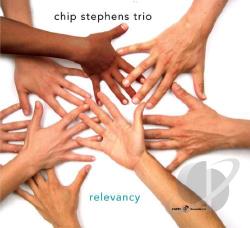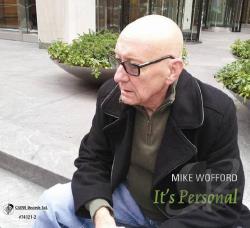Jazz saxophonist Darryl Yokley can blow his butt off. There’s no better way to sum up his playing. Proof is all over his self-produce debut “The Void,” a kaleidoscopic jazz album that should be taken as his mission statement to the jazz world. "The Coming of Shiva" and "Voo Doo" are originals that'll stick to your ribs, and are examples of his shrewdness as a leader and as a soloist. In 2010, Yokley moved to New York, and he's created opportunities for himself gigging, composing and teaching. The great jazz saxophonist and Criss Cross recording artist Tim Warfield has watched Yokley grow.
"Darryl is a young upcoming player whose made the decision to take on the Big Apple, and is slowly carving out a niche for himself. It can be very difficult to develop an individual voice when surrounded in such a technically efficient but rather homogeneous musical society. Time will tell as to what will be. So far, he seems to be moving towards a different path in his musical approach," Warfield said.
“Sound Reformation” is the name of Yokley's band, and he’s staffed it with some top earners trumpeter Duane Eubanks, pianist George Burton, bassist Luques Curtis and drummer Wayne Smith. I Dig Jazz questioned Yokley about his music, his views on the current state of jazz and his long term goals.
Share some of your background and talk about when you became interested in jazz.
I started playing the clarinet at age 10 then switched to saxophone when I was 11. I played in my schools band and jazz band. I studied privately from 8th grade on throughout high school and I received numerous awards and played in many honors bands in both my home state of California and North Carolina where I moved to in high school. I met my future college professor, James Houlik, at a clinic in Lenoir, NC.
After I heard him play, I had decided to become a soloist playing classical saxophone. I attended his camp for three summers in high school before I went to go study with him at Duquesne University in Pittsburgh, PA. It's at Duquesne where I got bit by the jazz bug, when I heard my good friend alto saxophonist Chris Hemingway play a solo and hearing him play jazz and classical equally well inspired me to pursue both genres on my instrument.
After Duquesne, I attended Michigan State to pursue more classical studies with concert saxophonist Joseph Lulloff. Although I became interested in jazz in my undergraduate studies, it always took a backseat to my classical studies for all my six years of college.
It wasn't until I finished with my graduate studies and moved to Philadelphia and needed to make a living when I delved into jazz more seriously. I learned a lot during my time in Philly from mentors like Sid Simmons, Mike Boone, Byron Landham, Roger Prieto, Tony Campbell, Don Wilson, Tim Warfield, Orrin Evans, and many others. After two and a half years in Philly, I moved to New York where I've been since.
What attracted you to the saxophone?
I always liked the sound of it. My first exposure to it was in oldies music, and as much as I hate to admit it my first exposure to it as a solo instrument was hearing Kenny G. I started out on clarinet briefly in fifth grade and then stopped. I then picked up a saxophone in sixth grade when my parents saw that I had a deep interest in music. The school I went to first only had one saxophone so all of us had to put our name in the pot for the lottery and I won. I always felt like from that point I was meant to play saxophone.
Parts of "The Void" has an old school jazz feel a la albums released on such labels as Blue Note, Riverside and Prestige back in the day. Did you look to those labels for inspiration?
Not really. I wasn't consciously going for an old school, new school, or mainstream feel. I just wanted to present a kaleidoscope of different pieces that showcased my diversity as a composer and improviser, the diversity of the band, and to have a musical product that could cross between genres.
Explain the album's title.
I chose the title based off a personal philosophy, which inevitably fused its way into my artistic philosophy. I derived the title from watching a documentary about Bruce Lee and hearing him talk about his philosophy of martial arts. The highest goal should be to express oneself as an honest human being free of any classification of style. So my goal is not to sound like a jazz musician, a classical musician, or whatever, just a musician with a story to tell.
What’s your take on the current state of jazz?
I think the way the music is taught has changed. Way back in the day going to school was very rare and even more rare was to go to school to learn how to play jazz, now jazz is a major mainstay in many universities. Some people look down upon learning the music at a University, but I'm of the belief that a good student will learn regardless of the medium he is presented the information in.
Now I will say that there are certain traditional lessons that have been passed down directly to musicians performing on the scene that will be missed by the student if they stay immersed in the academic side of things.
The bandstand and the scene still is the real school for learning the music in my opinion, but you can learn vital information at school as well, and it's a great social networking platform. Another thing I noticed that has changed is the most popular artist in the current generation isn’t swinging.
Some of the older generation take exception to this and do not validate this music as jazz because of this, but I have no qualms with it. They are playing the music of their times and it’s what they are hearing. I think because on the success some of these artists are achieving the resulting generations might be less inclined to even deal with swing at all.
Are you going to stick with jazz, or stray like some of your peers Robert Glasper and Christian Scott, for example?
I think I've already strayed from the plantation. As mentioned before I studied classical music mostly earlier on in my musical studies/career, but I have also played in R & B cover bands, salsa bands as well as having listened to these different genres of music so I think they are already present in the music. Now if we are talking about a straight up R & B album probably not because that's not what my group is about. The idea is to take music out of these different compartments and just have the music appreciated as great music. Not great jazz, great nu jazz, great swing jazz, great Latin music, great mainstream, or whatever. Just great music that is "beyond category" as Duke Ellington wishes his music to be known.
When did you form Sound Reformation, and what are some of the challenges keeping it together?
The current band playing together first came into fruition in November 2010 so we've been playing off and on for about two and a half years. Sound Reformation is a package with these specific members. Keeping a group like this together definitely has its difficulties such as setting up rehearsals between five busy schedules, keeping the band working enough, and most importantly is keeping the music fresh so that we all stay interested and are constantly searching. There have been times where the moment fell off, but ever since the album came out, and in particular this year, the band has started to delve into some new musical areas of searching which is exciting.
What kind of impact do you want to make with your music?
The mission is to present good honest music that people can appreciate and connect to as well. The reason I say it like this is of responses I hear from close friends or just talking to people I meet out in social settings. You ask them do they like jazz and they'll respond I love it. Then when questioned who they like or when was the last jazz concert they attended suddenly they seem to be at a loss. And I don't blame them.
A lot of people appreciate it and just like in pop culture they'll check out names that they've heard of. They appreciate it when they listen to it, but after the song or dance is over, they generally forget about it because they didn't really connect with it. This is not to say that I intend for my music to be watered down to attain fame in the sense of commercial pop, but the intent is to connect with audience on an emotional/spiritual level and in some cases on an intellectual level as well. I'd like the listener to walk away feeling something from the performance and also questioning the message of the music in certain cases.






